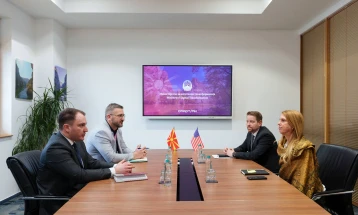Survey: Over 60% of citizens support EU membership aspirations, 20% drop in perception of US influence compared to last year
- Sixty-two percent of the population supports North Macedonia’s membership aspirations. The youngest and the oldest respondents are the most reserved, showing greater level of indetermination. The perception of US influence has dropped significantly, by 20 percent compared to last year, the findings reveal of the analysis of public opinion on North Macedonia’s accession to the European Union in 2024 based on a survey conducted in the period October-December 2024.

Skopje, 17 February 2025 (MIA) – Sixty-two percent of the population supports North Macedonia’s membership aspirations. The youngest and the oldest respondents are the most reserved, showing greater level of indetermination. The perception of US influence has dropped significantly, by 20 percent compared to last year, the findings reveal of the analysis of public opinion on North Macedonia’s accession to the European Union in 2024 based on a survey conducted in the period October-December 2024.
The survey was conducted by the Institute for Democracy “Societas Civilis” – Skopje (IDSCS) in cooperation with the Konrad Adenauer Foundation – Skopje, which has been monitoring trends and public perceptions regarding European integration for 11 years.
The results show that EU is seen as the country’s main economic partner, donor and ally. There is also a growing perception of the EU’s significant influence as an external factor. When asked about foreign policy priorities, citizens identified EU accession as the government’s top priority.
Prior to presentation of the findings, IDSCS President, Marko Troshanovski, said that young people show “openness to positive views toward China”, while older respondents show similar attitude toward Russia.
“This year, we see the support remains at 62 percent. The consistent slight decline we have been noting for the past decade seems to have paused, though this does not mean it will not continue in the broader picture. Still, we can say that most citizens continue to support the Union, and it remains the most preferred partner. Interestingly, the youngest and oldest respondents show the most hesitation about EU support. Among the younger respondents, we see more openness to positive views of China, while the older generation shows a similar openness toward Russia. Although the percentage isn't very high, it is still worth noting,” Troshanovski said.
He noted that even among young people, EU accession remains a priority, although the percentage supporting cooperation with China and Russia is "slightly higher compared to other age groups." However, he said, this does not indicate a "shift toward China" since this year’s survey was the first to include a question about China, and there are no comparable trends from previous years or any in-depth analysis of the reasons behind this.
Regarding the findings on the stance of political parties toward the Euro-integration process, Troshanovski stated that among the Albanian bloc parties, without exception, and among SDSM supporters, there is a “high, almost unanimous level of support for the EU.”
This year’s survey shows increased EU support among government supporters, particularly within VMRO-DPMNE, which Troshanovski described as an important fact.
“What is noticeable within VMRO-DPMNE is the growth of EU supporters, though it is slightly above half of their supporters. The rest are either neutral or considering other alternatives,” he noted.

Regarding ethnicity, he said that “Albanian citizens overwhelmingly support the EU,” while “among Macedonians, the figure is just over half.”
Commenting on the 20-percent drop from last year in the perception of US influence, he described it as a "repositioning of public opinion amid global trends, as the US slowly shifts its focus away from the region toward other geopolitical fronts.”
When asked about future expectations regarding this perception, given that the survey was conducted before the change of administration in the United States, he responded that this perception “will likely continue to grow regarding the reduced influence or interest of the US” due to the “new doctrine of US foreign policy, which is gradually withdrawing from the Balkans and Europe, leaving these regions largely to manage on their own.”
“Our strategic priority, of course, should remain the European Union, while maintaining the best possible relations with the United States, and here we must strike a balance. However, we must take a very proactive approach as a country, seeking modalities that will unlock the enlargement process based on more objective principles, which do not require a change in the negotiating framework. On the contrary, they call for the European Union to set standards for the future negotiating phases, not only in the case of Macedonia but also for other candidates,” said Troshanovski before presenting the findings of the survey.
Daniel Braun, head of Konrad Adenauer Foundation Office in Skopje, which partnered with IDSCS for the survey, said that the findings change every year.
“This year, the numbers we will present are not much different from last year, but if we look at previous analyses over the last decade, there are some changes in attitudes, especially among the youth, about where this country belongs in the European Union. We know what these changes are and why they happen, and they mostly involve the young people,” Braun said.
According to him, the presentation of the findings is timely, especially in the context of the ongoing security conference in Munich, and, first and foremost, he stated, in relation to transatlantic partnerships "which are now once again under question."
“However, Europe must know both its strengths and its limitations. The enlargement policy will understandably be more difficult due to the circumstances taking place, but still, it is the EU's responsibility to step up to the table, just as the US and Russia do at the moment when negotiations are taking place for Ukraine,” Braun added.
Photo: MIA archive/screenshot







